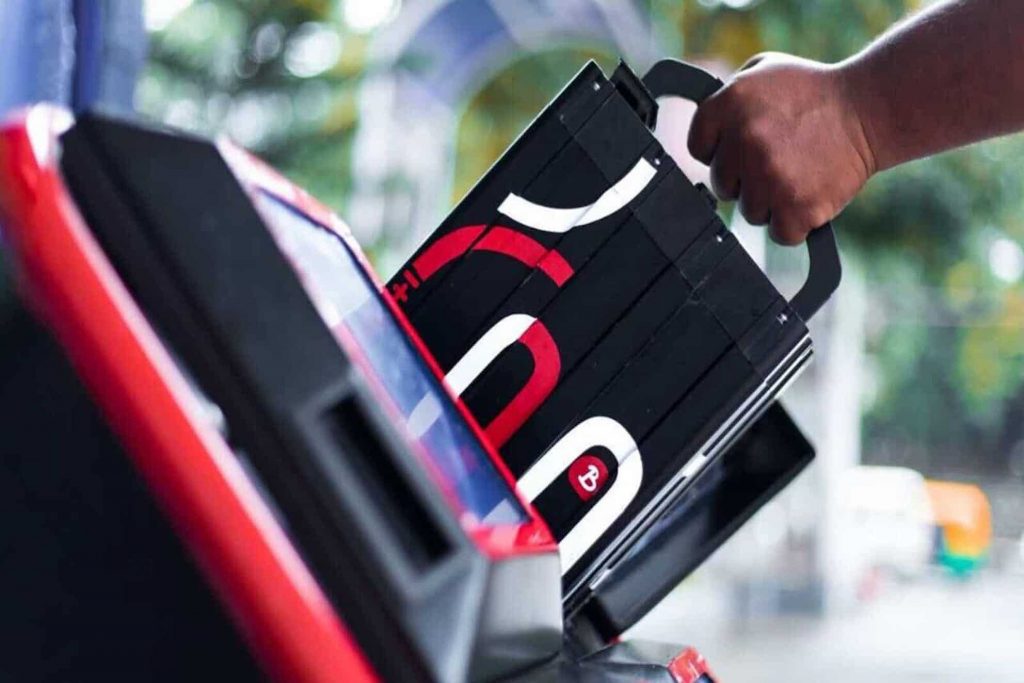India’s top planning body released the first draft of the national battery swapping policy on April 22, which will aim to promote the Battery-as-a-Service (BaaS) industry across India for the faster uptake of EVs. The policy will address important regulatory, financial and technical issues surrounding India’s battery swapping ecosystem to “de-risk” it, but it will only support advanced chemistries that are used in batteries that are equivalent to, or are better than, EV batteries currently supported under FAME-II. To ensure operational safety, the manufacturers will be required to equip the units with battery management systems (BMSs) to prevent thermal runaway (catching on fire), as well as internet-of-things (IoT) and remote monitoring and immobilisation features.
Furthermore, the batteries’ life cycle operation will be monitored by the manufacturers through a unique identification number (UIN), and the units will have to comply with the AIS 156 (2020) and AIS 038 Rev 2 (2020) standards. The draft policy will be open to comments and suggestions till June 5, 2022.
Australian scientists to traverse country on Tesla powered by printed solar panels
A team of scientists in Australia will gear up to traverse the nation on a Tesla solely powered by printed solar panels, and the 84-day trip in September 2022 will be used to raise awareness about the possibilities with EVs and about climate change. The solar panels will be printed by a standard commercial printer — one that prints wine labels at the moment — on PET plastic and will only cost about $10/sq. m, but each of the 18 panels will be 18 metres long to soak up as much solar energy as possible. The trip will take the scientists to nearly 70 schools across Australia and they hope that their efforts will make Australians re-think their range anxiety about EVs. The journey may also be similar to a previous long-distance record set for the vehicle, when a Tesla was hypermiled to 1,078km on a single charge in 2017 by the Tesla Owners Club Italia.
India: Tesla to provide $1billion worth of BESS, must not import cars from China
Tesla Power USA announced that it would lease out USD 1 billion worth of battery energy storage systems (BESS) to its Indian customers over the next two to three years, as part of its plan to cater to India’s expanding energy market. The service will enable customers to only pay for OPEX (operational expenses), instead of having to set up and maintain their own battery storage systems under the vastly more expensive CAPEX (capital expenditure) model.
Tesla’s electric cars division, on the other hand, is being discouraged from manufacturing its cars in China and selling them in India by Nitin Gadkari, India’s transport minister, possibly as a step to encourage it to set up shop within India’s borders. Tesla founder Elon Musk has repeatedly pointed out India’s very high import tariffs on vehicles manufactured outside the country, which has been a deterrent for the carmaker to sell its EVs in the country.
Tata Motors discovers record low prices for e-buses under new CESL tender
Tata Motors discovered record low prices for the per kilometre operation of its electric buses — at Rs. 43.49 for 12m buses and Rs. 39.21 for 9m buses — and emerged as the lowest bidder in CESL’s new tender to aggregate demand for the vehicles. Called the Grand Challenge, the Rs. 5,000crore-tender will help deploy 5,450 e-buses across Delhi, Bangalore, Hyderabad, Surat and Kolkata and the buses are assured a service life of at least 12 years. During this period, they are expected to cover 4.71 billion kilometres and prevent 3.31 million tonnes of CO2 from being released into the atmosphere. The tender was developed under the remodelled FAME-II scheme and is also expected to create 25,000 jobs.
Delhi govt to raise taxes on ICE cars to promote EVs, Centre halts e2W launches
The Delhi government is reportedly planning to raise the road taxes on new petrol, diesel and CNG cars registered in the state to make electric cars the more attractive option for new car buyers. The most expensive cars will be targeted first and the new tax structure may come into effect within the next few months. The move is also being seen as a part of the state government’s target to have EVs account for 25% of new vehicle sales by 2024, whereas the share stands at 12.6% at the moment.
Also, the national government issued an order to all electric two-wheeler manufacturers to halt the deliveries of their vehicles until the recent spate of the vehicles catching on fire is investigated. The manufacturers will have to recall their vehicles from any faulty batch, and Okinawa, Ola and Pure EV have already recalled 7,000 units.
Honda to sell 750,000-800,000 EVs in North America by 2030
Leading carmaker Honda Motor Co. announced that it would aim to sell 750,000-800,000 electric vehicles in North America by 2030, and the vehicles will be developed on its three new platforms that it will work on, along with General Motors (GM). The announcement comes just two weeks after the carmaker pledged to invest nearly $40billion in developing 30 new EV models by the end of the decade, and it is likely to prefer the use of solid-state batteries over conventional lithium-ion units for a greater operational range.
About The Author
You may also like
Battery recycling: The missing link in India’s EV supply chain?
New report shows ways to build an efficient e-bus ecosystem in India
Corporate watchdog accuses Toyota of misleading marketing, greenwashing
Electrifying India’s Roads: Financing EVs – Challenges, Progress and the Road Ahead
Five lithium and cobalt mines identified in overseas exploration


